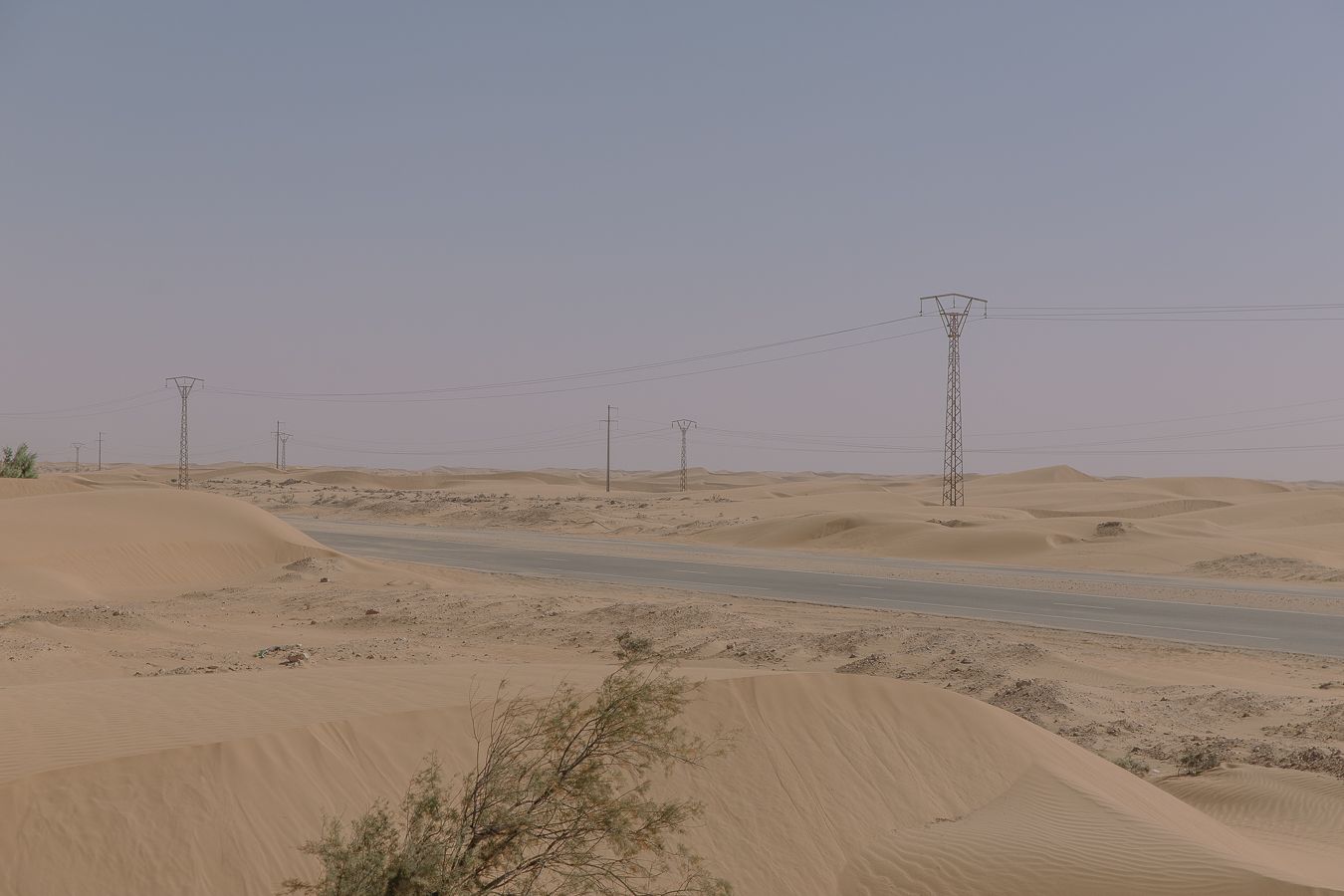
A new industry is emerging in occupied Western Sahara: mining and exports of salt.

If you live in a cold European country, chances are that footpaths and roads in your neighbourhood in the future will be de-iced with salt from occupied Western Sahara.
Western Sahara is illegally and brutally occupied by its neighbouring country, Morocco. The occupation is upheld by Morocco's unethical plunder of the territory. The UN legal Office stated in 2002 that further exploration or exploitation of mineral resources would be in violation of international law. Yet, Saharawis in the occupied territory, who to a large extent are unemployed and marginalised in their own country, are now observing how a new mine is slowly being built north of the capital El Aaiun (also written 'Laayoune').
The Texas based company behind the mine, Crystal Mountain, gives on its webpages the impression that the operations take place in Tarfaya, Morocco. Doing business in Tarfaya, which is within Morocco proper, would be uncontroversial. However, research conducted by Western Sahara Resource Watch shows that the salt mine is not in Morocco.
The mine is, in fact, located in Oum Dbaa, south of the Morocco-Western Sahara border (shown as a red line on the Google Earth map below). The photos and videos in this article were recently taken within the occupied territory.

Although no states in the world recognise the Moroccan claims to the territory, Crystal Mountain's map shows a Morocco almost twice the size than the internationally recognised. According to Crystal Mountain's webpages, the company can offer "Shipping out of the Port of Laâyoune, MAROC". However the city of Laayoune, or El Aaiun, is not at all in "Morocco", as the company claims. It is the capital of Western Sahara. See a screenshot of the erroneous webpages below.
The company states on its webpages that the production as of 2013 will be below 200,000 tonnes/year, and that it plans to expand rapidly: From 2016, the company is scheduling to produce 1 million tonnes/year. The company writes that the salt can be used for fish industry, agriculture - and for de-icing of roads.
It is not known what income the Moroccan government today gains from the extraction in the occupied territory, or whether Saharawis from Western Sahara will be employed in the mine. WSRW has never heard or seen proof of the company ever consulting the Saharawi people whether they want the operations to take place in the first place. Such consent would be a necessity if the operation were to be in accordance with international law, according to the UN.
According to Saharawis in El Aaiun, the production is currently taking place 24 hours a day, and almost all the employees are Moroccan settlers.
21 November 2012, WSRW sent a letter to the US company Crystal Mountain requesting the exact location of its operations in Western Sahara.
"It is our opinion that the activities of foreign businesses in Western Sahara, working in partnership with Morocco, contribute to undermine the UN peace process", stated Western Sahara Resource Watch in its letter to Crystal Mountain.
The company confirmed the receipt of the letter per phone on 15 December 2012, but has still not responded.
"Based on the evidence that the mining takes place within occupied Western Sahara, we urge the company to immediately halt its further operations. No such mining should take place in the occupied territories until a solution to the conflict is found", stated Erik Hagen, chair of WSRW.
In the second half of 2012, Crystal Mountain published a job announcement for a vacant position as a full time engineering manager for the salt mine "located in Southern Morocco between Tarfaya and Laayoune". The announcement describes in more detail the plans that the company have for its operations: construction of mine, ponds, roads, pumps, drilling wells, installing crushing equipment, electrical supplies, bagging facilities, and setting up of systems of trucking and bulk ocean shipping.
The company is a subsidiary of the independent petroleum engineering consulting firm Lonquist & Co, LLC from Austin, Texas. Crystal Mountain secured last year 3,5 million dollar through issuing of new shares to 29 investors, according to a filing with the U.S. Securities and Exchange Commission.
An other company, seemingly Moroccan, has been marketing salt from "Laayoune, Morocco" on online marketplaces since 2011. The company is called Bus Bio Industries, and takes minimum orders of 2200 tonnes, and has a total supply capacity of 50,000 tonnes. It is not known if this is from the same area as the one of Crystal Mountain. See examples of online marketing here and here.
There are several salt deposits in Western Sahara. Award-winning French photographer Yann Arthus-Bertrand took a shot of Sebkhet Aridal, close to Bojador, south of El Aaiun.
Download video files of the salt industry here:
Video 1
Video 2
Video 3
Video 4
Video 5
Video 6
Download high resolution of the top photo in this article here.

Morocco pushes enormous green hydrogen plans in occupied Western Sahara
The Moroccan government has confirmed several green hydrogen projects totalling 20 GW of renewables and up to 8 million tonnes of derivatives - many planned in occupied Western Sahara.
What happened to the Dakhla bitcoin wind park?
The long-promised Bitcoin wind farm in occupied Western Sahara has seemingly come to a complete standstill.
These firms want to supply Morocco with energy from occupied land
GE Vernova, Siemens Energy and Larsen & Toubro are among the multinationals that have reportedly expressed interest to aid Morocco transport energy generated in occupied Western Sahara to Morocco proper.
GE Vernova under pressure in occupied Western Sahara
The US company GE Vernova is seemingly gambling with its lucrative projects elsewhere when it operates in occupied Western Sahara for the Moroccan government.



